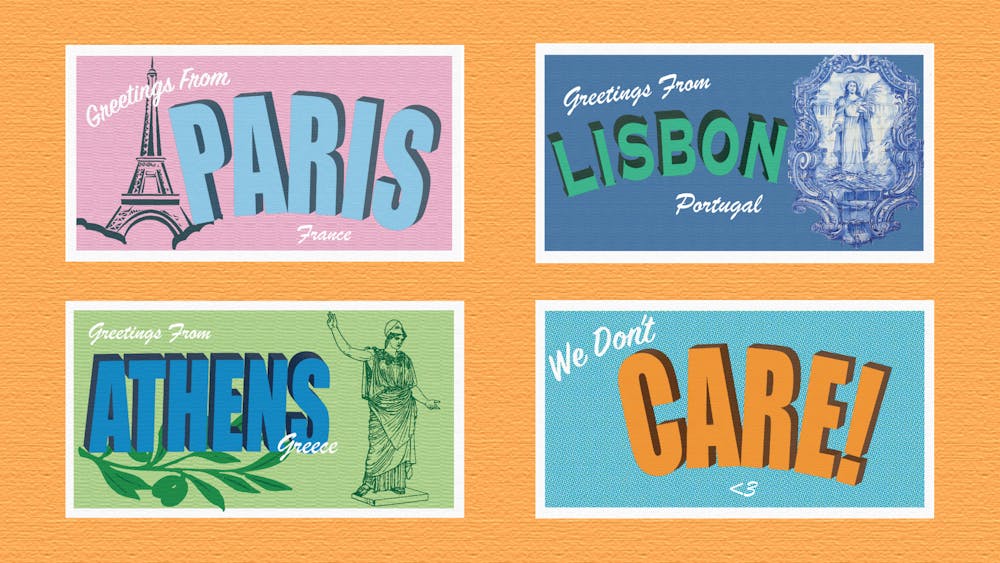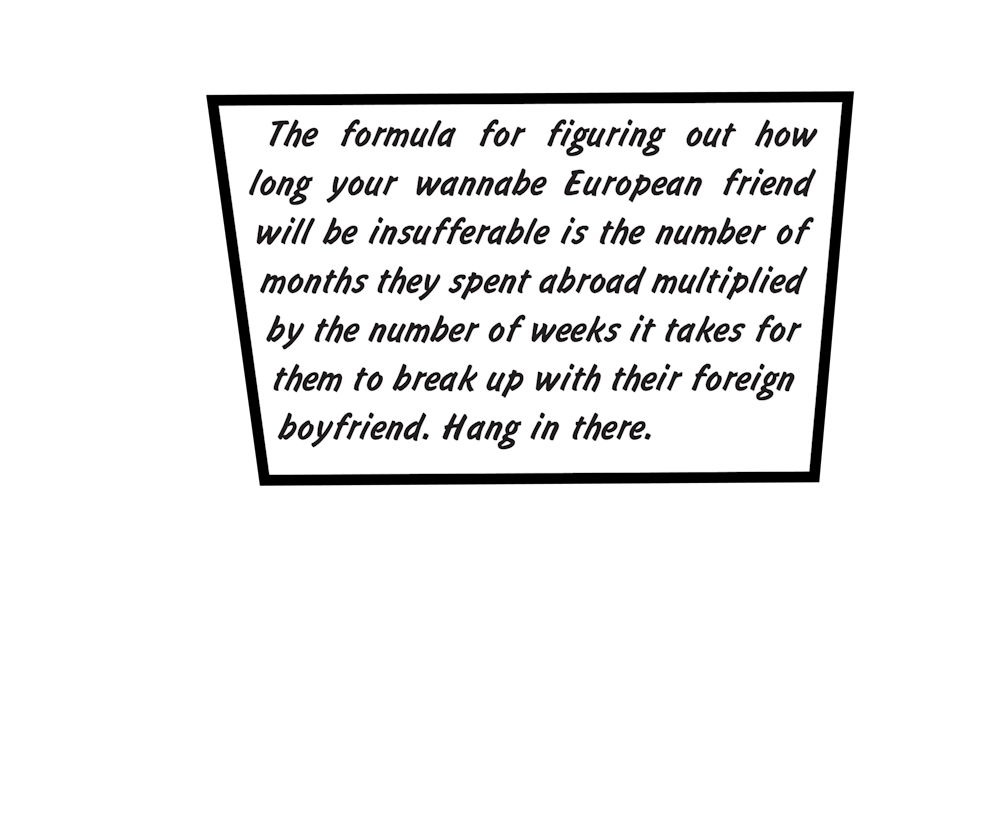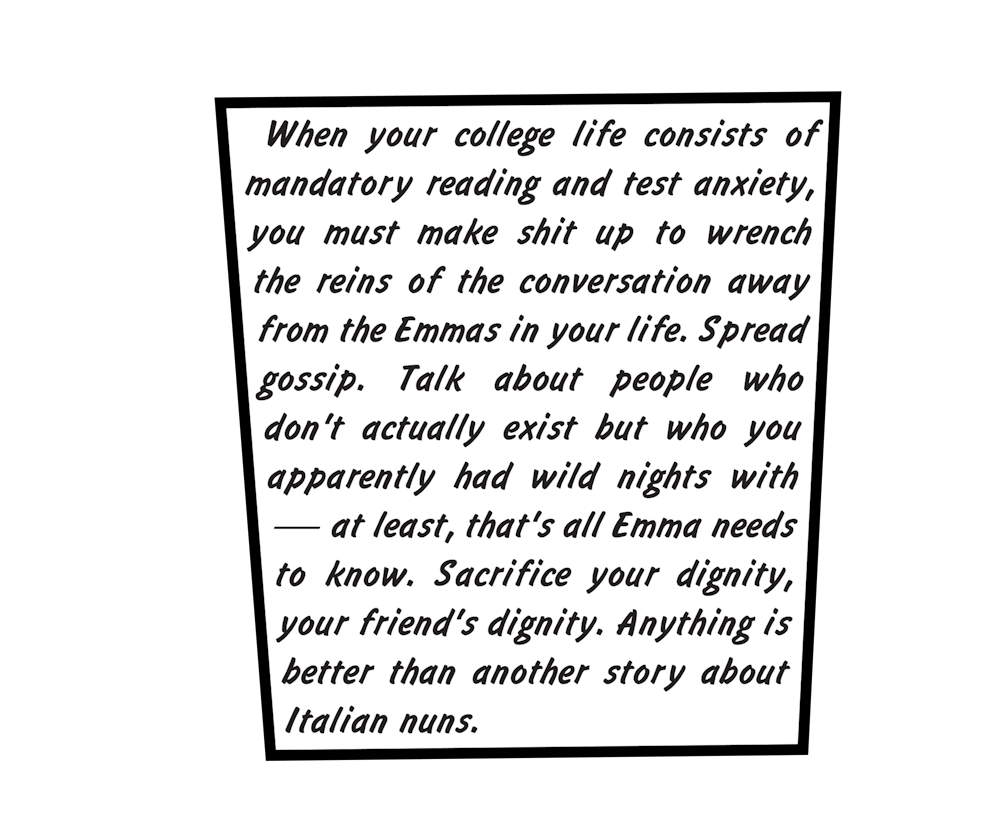"The last thing I did in Italy was stroll through a piazza with a cappuccino in hand — did I mention that?"
Every year, thousands of ASU students embark on a study abroad experience, with many of them making a long-awaited pilgrimage to Europe. Sure, some return with a new perspective on the world, but honestly, most come back absolutely intolerable. You'll know them when you see them — just look for the people who start every conversation with "back when I was in Europe..."
These one-time world travelers are constantly bragging that during their experience abroad, they were challenged academically, learned to speak the local language "fluently" and came to appreciate the "simple, little lives" of their host families. Except, we already knew that because they felt a compulsive need to let the rest of us know what a fulfilling time they had visiting Europe's overcrowded tourist traps — I mean hidden gems — on social media.
These professional globe-trotters considered it their job to diligently document their four months in Italy and report back to those stuck in the States, who aren't as well-traveled and cultured as them.
Their Instagram feeds look like Pinterest boards filled with every piece of artisan bread they consumed, quaint bridges and cobblestone streets you hope they tripped over while their eyes were glued to their phones watching the likes pour in on their latest post.
While I am guilty of hate-liking these photo dumps and commenting "GORGEOUS!" I've finally had enough.
You would think the constant, not-so-humble bragging — through meaningless "aesthetic" photos that just clog your feed and 20-slide-long Instagram stories of random scenery in Greece — would end when their plane touches down in Arizona and they're sentenced to a car-centric lifestyle in the States like the rest of us peasants. But no, it's just the beginning.
When they inevitably return from their riveting journeys, they act like gallant adventurers from the Age of Exploration who just discovered cheese that isn't wrapped in plastic. Naturally, they have to share their revelation with anyone they can trap for 30 minutes. But don't let it make you miserable. In fact, let me introduce you to a life-changing discovery: Former study abroad students are very easy to mess with.
These are examples of real conversations I've had with friends who came back from Europe annoyingly ready to overshare, and how I got my revenge.
'When I was in (insert European destination of choice)...'
"When I was in Florence, I would volunteer at this local orphanage and practice my Italian with the nuns and kids," my friend, Emma, said as we caught up over coffee, or — as she would call it — caffè.
"I just felt so present, and it made me appreciate the little things in life, you know?"
"I can imagine," I bit back. I couldn't. Emma spent most of her study abroad trip boarding planes to Berlin and Madrid for 48-hour-long clubbing adventures, and prowling around Paris on the hunt for a French boyfriend. I know this because she called me from all three places to fill me in on her latest escapade, regardless if it was 3 a.m. in Arizona. As far as I can tell, she spent very little time exploring Florence, where she was supposed to be taking a full semester of classes.
"The Italians weren't very welcoming to study abroad students," Emma prattled on. "I got so many dirty looks just from walking down the street." Probably because she wears athleisure and puts ice in her wine.
"Even from the nuns?" I asked naively. And that is how they trap you. You ask one innocent question about their trip, and you can say goodbye to any hope for a pleasant evening.
After she name-dropped the 15th European country she visited — I kept count — I desperately made eye contact with the other poor soul trapped in this conversation with me. At that moment, we elevated to a higher plane of existence and communicated telepathically to devise a plan.
My ally and I spun an otherwise ordinary semester at ASU into tales that could become Tempe Barstool legends. Ragers every night. Tinder dates gone wrong. Tinder dates gone right. Coveted internships and jobs were secured. Friend groups exploded. All complete exaggerations, like stories from any study abroad.
Emma never reached out again. Audrey: 1, Emma: 0
'You wouldn't get it'
Another archetype produced by studying abroad is The Intellectual. These faux philosophers are usually history majors who spent their time roaming museums and staring at a singular painting for two hours. You get the impression that they read "The Secret History" once and decided to make it their entire personality.
This was the case for my dear friend, Joe, who spent last spring in Spain, specifically Madrid and Barcelona — or as he says it now, Barthelona.
One evening in early August, we took a walk together and caught up on each other's lives. I could tell he was just waiting for me to ask, "So, how was Spain?" Like the amazing friend I am, I indulged him. Little did he know, I was no rookie. Emma had made me a veteran of study abroad conversations, and I was prepared to go to war again.
I let him muse about his internship at the U.S. embassy in Madrid and what an honor it was to see democracy in action abroad. Like the gentleman he is, he then apologized for getting overly excited and using terms I apparently didn't know, like "visa" and "expat." And then his monologue pivoted into the weekends he spent absorbing Spain's culture, usually on solo walking tours of the city.
"I liked walking around by myself," Joe said. "It just makes you feel more grounded in a place, and you can really connect with the locals."
"How exciting," I replied. I'd rather wash dishes.
Internally, I laughed at the thought of him imagining himself as Ethan Hawke's character in "Before Sunrise" — romantic, lonely and wandering in search of the meaning of life.
Naturally, Joe name-dropped all the museums he went to and the paintings that moved him. Ever the sensitive thinker.
"Seeing Diego Veláthquez's works in person — I can't describe it," he said. "You wouldn't get it. You have to see it in person." I roll my eyes. "I think he's one of the greatest Romantic painters to ever exist."
And that right there is what we've all been waiting for.
"What are you talking about?" I interject, heading in for the kill. "Velázquez was a Baroque painter."
After that, Joe asked his first question about my life since he got back. Audrey: 2.
'I can never live in the U.S. again'
For some, the European lifestyle may be a pleasant distraction from life in the States, but the U.S. will always be home. For others, one sip of caffè espresso from its motherland and functional public transportation are enough to make them never want to return to America.
What's complicated about these wannabe expatriates is you can't blame them. Fleeing the country has crossed every American's mind at least once — if their critical thinking skills are still intact. But that doesn't mean you can't find a way to poke fun at them for thinking that Europe calls them in a "deeper" way.
I do this often with my friend, Harper, who is notably one of the least annoying study abroad students I know. After she graduates in May, she's immediately returning to Ireland, where she already has an apartment secured.
And I can't blame her. I too would move to the most unproblematic country in Europe — and the home of Paul Mescal — in a heartbeat. But sometimes, she'll get this look in her eye, and I can tell she's about to dive into a long rant about how much she hates the U.S. freeway system and how she can't wait to walk everywhere in a couple of months.
When this happens, I like to bring up U.S. politics and ask, "So, who are you planning to vote for in the presidential election again? Have you looked up each candidate's stance on public transportation? Will you come home to vote?" This prompts her to let out a long, drawn-out sigh.
"You can't just leave all your friends to deal with this mess without at least doing your civic duty," I admonish her. Then, I gleefully blast Celtic folk music as we merge onto Interstate 10 during rush hour. Audrey: 3, TKO.
Keep it to yourself
If there's a study abroad student in your life, first, identify what archetype they fall into, and then plot in preparation for their homecoming. Tailor your tactics to wherever they spent the past however many months gallivanting about. Do some anthropological research. Trust me, it'll all be worth it in the end.
If you are a former study abroad student and have enough self-awareness to recognize yourself in these pages, respectfully, shut up.
Edited by Camila Pedrosa, Savannah Dagupion and Madeline Nguyen.
This story is part of The Culture Issue, which was released on Feb. 28, 2024. See the entire publication here.
Editor's notes: The opinions presented in this column are the author's and do not imply any endorsement from State Press Magazine or its editors.
Reach the reporter at aeagerto@asu.edu and follow @audrey_eagerton on X.
Like State Press Magazine on Facebook, follow @statepressmag on X and Instagram and read our releases on Issuu.
Audrey is a senior studying journalism and mass communication. This is her fifth semester with The State Press. She has also worked at The Arizona Republic.







